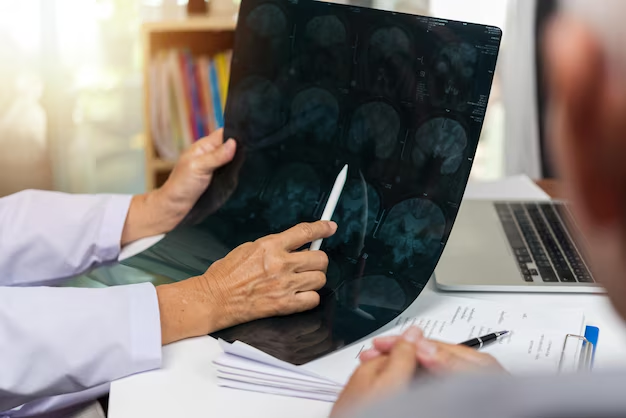Your Guide to What Part Of Brain Does Parkinson's Affect
What You Get:
Free Guide
Free, helpful information about Parkinsons FAQ and related What Part Of Brain Does Parkinson's Affect topics.
Helpful Information
Get clear and easy-to-understand details about What Part Of Brain Does Parkinson's Affect topics and resources.
Personalized Offers
Answer a few optional questions to receive offers or information related to Parkinsons FAQ. The survey is optional and not required to access your free guide.
Understanding Parkinson's Disease: What Part of the Brain Does It Affect?
Parkinson's disease is a complex neurological disorder that primarily impacts movement, leading to tremors, stiffness, and difficulty with balance and coordination. But what part of the brain does it affect? The primary brain area affected by Parkinson's disease is the substantia nigra, a region nestled in the midbrain responsible for producing dopamine. Dopamine is a neurotransmitter essential for coordinating smooth and balanced muscle movements, and its deficit is the root of the movement-related symptoms associated with Parkinson's.
The Role of the Substantia Nigra
The substantia nigra is part of a complex system known as the basal ganglia, which also includes other structures like the striatum and the globus pallidus. The basal ganglia are critical for movement control, and dopamine-producing neurons (nerve cells) in the substantia nigra are central to their function. In Parkinson's disease, these neurons gradually deteriorate and die, resulting in decreased dopamine levels. This decrease leads to the hallmark symptoms of Parkinson's such as bradykinesia (slowed movement), rigidity, and tremors. The exact cause of neuron degeneration in Parkinson’s is still under research, but both genetic and environmental factors seem to play a role.
Broader Impact on the Brain
While the degeneration of neurons in the substantia nigra is the most prominent feature of Parkinson's, it isn't the only brain region affected. As the disease progresses, other parts of the brain and non-dopaminergic systems also experience changes. For instance, the cortex, responsible for more complex brain functions, may eventually be affected, influencing cognitive abilities. Additionally, the thalamus and amygdala might also become compromised, affecting emotional regulation and sensory processing.
Navigating Life with Parkinson's
Understanding the neurological underpinnings of Parkinson's can be daunting, but knowing what to expect can help those affected manage their journey more effectively. Treatment typically involves medication, such as Levodopa, which helps replenish dopamine levels, alongside therapies like physical therapy, and sometimes surgical interventions like Deep Brain Stimulation (DBS).
Living with Parkinson's can also bring financial challenges, given the potential need for ongoing treatment and care. Fortunately, several financial aid options and government programs are available to help manage costs:
- Social Security Disability Insurance (SSDI): Offers financial assistance to individuals unable to work due to Parkinson’s.
- Medicare and Medicaid: Provide coverage for many healthcare services, including some treatments and therapies related to Parkinson’s.
- Non-profit Organizations: Groups like the Parkinson’s Foundation or the Michael J. Fox Foundation can help provide resources and financial aid opportunities.
Maximizing Financial Support
Navigating through medical treatments and daily life adjustments can lead to financial strain. Thankfully, there are solutions to ease the burden:
- Debt Relief Options: Consider consulting with a debt counselor to explore managing existing debt and identify potential relief plans.
- Credit Card Solutions: Some credit cards offer features like no-annual-fee or low-interest plans that could help in managing expenses.
- Educational Grants and Scholarships: For caregivers or family members, returning to school for healthcare-related education might provide long-term benefits, both for understanding the disease more deeply and enhancing their career prospects.
📚 Financial Support Resources:
- SSDI Benefits: Provides income for those unable to work due to Parkinson's.
- Medicare/Medicaid: Coverage for various medical and healthcare needs.
- Parkinson's Foundation Grants: Financial assistance and support programs.
- Debt Relief Programs: Options for managing and forgiving debt.
- Credit Solutions: Credit cards with healthcare-centric benefits.
- Educational Opportunities: Scholarships and grants for career advancement in healthcare fields.
Maintaining quality of life with Parkinson's involves proactive treatment, comprehensive understanding, and utilizing available resources. While the journey may be challenging, financial programs and educational tools can offer vital support to manage the impact of the disease effectively.
What You Get:
Free Parkinsons FAQ Guide
Free, helpful information about What Part Of Brain Does Parkinson's Affect and related resources.

Helpful Information
Get clear, easy-to-understand details about What Part Of Brain Does Parkinson's Affect topics.

Optional Personalized Offers
Answer a few optional questions to see offers or information related to Parkinsons FAQ. Participation is not required to get your free guide.


Discover More
- Are There Environmental Causes Of Parkinsons
- Can Alcohol Cause Parkinson's
- Can Concussions Cause Parkinson's
- Can Concussions Cause Parkinson's Disease
- Can Dogs Get Parkinson's Disease
- Can Dogs Get Parkinsons
- Can Dogs Have Parkinson's
- Can Dogs Have Parkinson's Disease
- Can Females Get Parkinson Disease
- Can Head Trauma Cause Parkinson's
